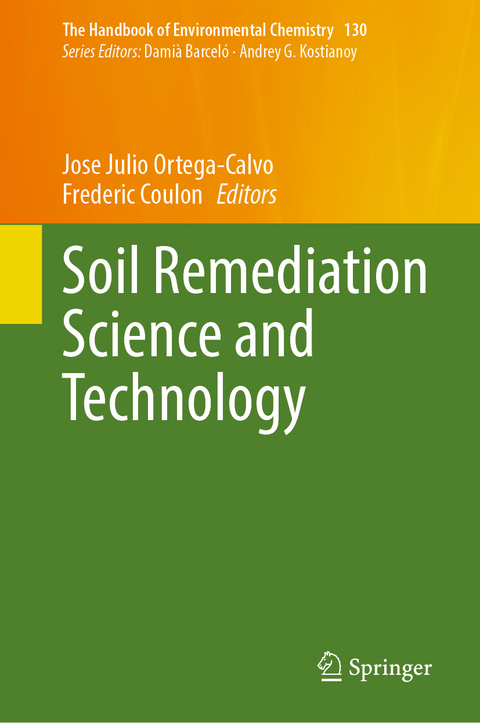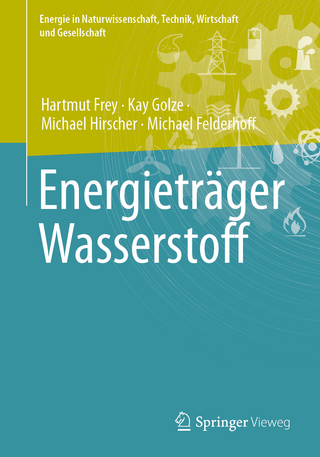
Soil Remediation Science and Technology
Springer International Publishing (Verlag)
978-3-031-60191-0 (ISBN)
This book reviews the latest advances in soil remediation and is an authoritative account of the environmental chemistry, microbiology, ecotoxicology, and regulation policies of soil pollution. The book also discusses possible pathways for innovation, by incorporating state-of-the-art knowledge on sustainability, nature-based solutions, and socio-economical aspects. Divided into four parts, the book opens with an overview of the legal context and policy economy of soil pollution and remediation. The management of contaminated soils has a high cost and, although much of this cost is borne by companies, there is also high public spending. The strategic value of soil, the extensive costs associated with the remediation of many polluted sites throughout the World, and the current crisis demand for new solutions to soil remediation that are addressed in the following parts of the book. In this book, readers will find a comprehensive description of several remediation strategies by different pollution sources, nature-based solutions, and physicochemical methods for the remediation of contaminated soils. Particular attention is given to contaminated soils from industrial activities, urban settings, mining, and military activities. In the final chapter of the book, the editors present a perspective of the field, research trends and needs. Given its breadth, this book appeals to regulators, industrial scientists, and scholars alike.
José-J. Ortega-Calvo is a Researcher at the Institute of Natural Resources and Agrobiology of Seville, Spanish National Research Council (IRNAS-CSIC). He has worked on bioavailability and biodegradation of organic pollutants for the last 25 years. After obtaining his PhD in 1991 at the University of Seville, he worked on different microbial ecology aspects during postdoctoral stays at the University of Amsterdam (UvA, The Netherlands) and Cornell University (USA). Dr Ortega was in 2016/2017 the European President of the Society for Environmental Toxicology and Chemistry (SETAC Europe) and, from June 2017 to June 2023, a member of the Stakeholder Bureau of the European Food Safety Authority (EFSA). He is a member of the External Science Advisory Panel (ESAP) of the Long-Range Research Initiative at the European Chemical Industry Council (CEFIC-LRI), and Associate Editor of Science of the Total Environment and Critical Reviews in Environmental Science and Technology journals.
Frederic Coulon is a Professor of Environmental Chemistry and Microbiology at the Centre for Water, Environment and Development at Cranfield University, UK. He has a 24-year international research and consultancy career in water, energy and soil science, diagnostic strategy and risk analysis and management. Trained in chemistry, microbiology, and environmental engineering (University of Perpignan, France) and risk management (Cranfield, UK), he led several projects on soil and water protection and recovery, industrial and hazardous waste management, wastewater treatment and risk management. His work enabled to construct innovative decision-support tools for contaminated sites that improved the confidence in remediation (restoring to use) technology, reduce remediation costs and minimize waste disposal to landfill, with subsequent savings in CO2 emissions. His work further influences policy development and provides pragmatic, risk-based solutions to remediate contaminated sites. He has published numerous articles in leading environmental engineering and science journals, book chapters and articles for the popular press with substantive contributions to oil remediation, process emission and control at industrial sites and environmental risk management. He is the chair of the NICOLE Academic subgroup, the leading European network on sustainable land management of industrially contaminated sites, co-Editor in Chief of Environment International, Section Editor of Heliyon Environment and Associate Editors of Science of the Total Environment and Critical Reviews in Environmental Science and Technology journals.
Chapter 1 Introduction setting of the Scene, Definitions, and Guide to Volume.- SECTION 1: Legal and Policy Context.- Chapter 2 Soil pollution framework in Europe.- Chapter 3 Industrial Soil Remediation Policy and Regulation in the European Union.- SECTION 2. Remediation of Contaminated Soils.- Chapter 4 Managing Per- and Polyfluoroalkyl Substance (PFAS) Contamination in Agricultural Soils: Investigating Remediation Approaches in Non-conventional Agriculture.- Chapter 5 Remediation of soils polluted by urban settings.- Chapter 6 Review of Digital Solutions for Soil Contamination Management by Mining Activities.- Chapter 7 Remediation of soils polluted by military activities.- Chapter 8 Remediation of soils polluted by oil industries.- SECTION 3. Nature-based solutions for soil remediation.- Chapter 9 Soil Bioamendment as a Low-Carbon Approach for Microbial Remediation of Organic and Inorganic Pollutants.- Chapter 10 Drivers for Efficient Bioaugmentation and Clean-Up of Contaminated Soil.- Chapter 11 Sustainable Low Carbon and Bioaugmentation Strategies for Bioremediation of Oil-Contaminated Acidic Wetlands.- Chapter 12 Phytoremediation of Co-contaminated Soils by Heavy Metals and Persistent Organic Pollutants.- Chapter 3 Bioremediation of Soils Contaminated with PFAS: An Update on Available Techniques, Pilot Studies, Challenges, and Future Directions.- SECTION 4. Physicochemical processes employed in soil remediation.- Chapter 14 Physicochemical Remediation of Soil Contamination: From Laboratory to Field.- Chapter 15 Coupling Physical and Chemical-Biological Techniques for the Remediation of Contaminated Soils and Groundwater.- Chapter 16 Concluding remarks and research needs.
| Erscheinungsdatum | 25.06.2024 |
|---|---|
| Reihe/Serie | The Handbook of Environmental Chemistry |
| Zusatzinfo | X, 437 p. 52 illus., 26 illus. in color. |
| Verlagsort | Cham |
| Sprache | englisch |
| Maße | 155 x 235 mm |
| Themenwelt | Naturwissenschaften ► Chemie ► Technische Chemie |
| Schlagworte | bioaugmentation • Contaminated Soils • ecotoxicology • Electro-nano remediation • Environmental Policy • low-carbon bioremediation • nature-based solutions • Phytoremediation • remediation • Soil Pollution • Soil Pollution by industry • soil pollution by military activities • soil pollution by mining activities • soil pollution by urban settings • sustainability |
| ISBN-10 | 3-031-60191-2 / 3031601912 |
| ISBN-13 | 978-3-031-60191-0 / 9783031601910 |
| Zustand | Neuware |
| Informationen gemäß Produktsicherheitsverordnung (GPSR) | |
| Haben Sie eine Frage zum Produkt? |
aus dem Bereich


